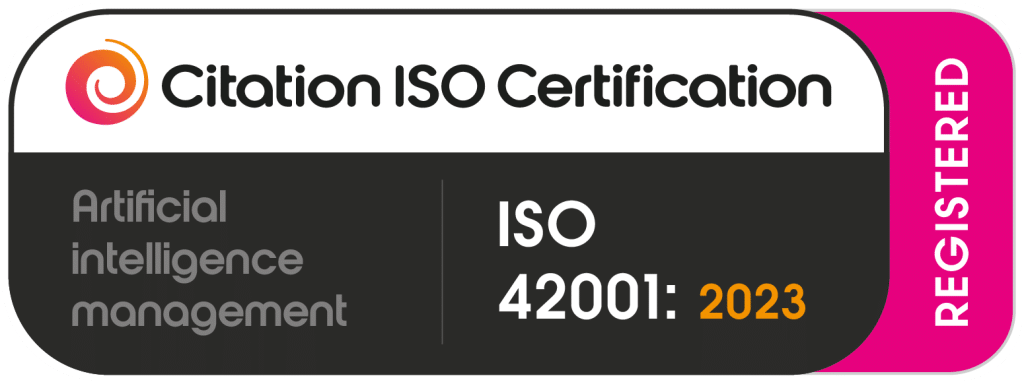Artificial Intelligence (AI) is one of the most revolutionary technologies in use today. AI has changed the way we live, work, and interact. It’s important to understand the basics of AI to fully grasp its potential. We outline these basics of AI and outline its evolution, role across different industries, and more.
Understanding the Basics of Artificial Intelligence
Artificial Intelligence (AI) is the development of computer systems that can perform tasks. These tasks typically require human intelligence. These tasks include problem-solving, decision-making, and learning. Artificial general intelligence mimics the human brain and thinking. AI, however, functions at a speed and with accuracy beyond our capabilities.AI is a branch of computer science that aims to create intelligent machines capable of performing complex tasks that would normally require human intelligence. These tasks can range from recognizing speech and images to playing games and driving cars. AI encompasses a wide range of technologies, including machine learning, natural language processing, computer vision, and robotics. Machine learning, in particular, enables AI systems to improve their performance and learn from data without being explicitly programmed.
Machine learning involves the development of algorithms that learn patterns and make predictions. Machine learning is a key component of AI that has revolutionized the field in recent years. Machine learning enables machines to analyze vast amounts of data and extract meaningful insights from it. By learning from this data, AI systems can make accurate predictions and decisions, often surpassing human capabilities. This ability to learn and adapt, and exhibit intelligent behavior, is what sets AI technology apart from traditional computer programs.
The Evolution of AI: A Brief History
The concept of AI has been around for decades. Recent advancements in computing power and big data have propelled it to new heights. AI was first developed in the 1950s, where early AI researchers aimed to build machines that could mimic human intelligence. Today, AI algorithms can outperform humans in various tasks, from playing complex games to diagnosing diseases. In the early days, AI researchers focused on developing expert systems that could mimic human expertise in specific domains. These systems were based on rule-based programming, where a set of predefined rules guided the machine’s behavior. As computing power and computing machinery increased and more data became available, researchers realized that a different approach was needed.
This led to the development of machine learning algorithms. Machine learning algorithms learn from data and improve their performance over time. This shift marked a turning point in the field of AI, as it enabled a machine learning model to become more autonomous and adaptive. The development of artificial neural networks further extended AI’s capabilities. Deep learning algorithms have further expanded AI’s utility in terms of machine learning models. Large language models are now commonplace throughout business and industry. What was once science fiction, or reserved for data science specialists or a computer scientist, is now easily accessible for everyone.
Today, AI is being applied in various industries and domains. AI changes the way we live and work, enabling us to solve complex problems and make better decisions. As AI continues to evolve, its effect on society will only grow, opening up new possibilities and challenges.
The Role of AI in Various Industries
Artificial Intelligence (AI) has become a game-changer in today’s world, with its potential extending beyond a single industry. Its applications are being employed across various sectors, revolutionizing the way we live and work.
AI in Healthcare
In the healthcare industry, AI has shown tremendous promise in improving patient care and treatment outcomes. From early disease detection through AI-enabled diagnostics to personalized medicine and robotic surgeries, AI is transforming healthcare delivery.
AI can assist healthcare professionals by analyzing complex medical data, predicting patient outcomes, and helping in the discovery of new drugs and treatments. By leveraging machine learning algorithms, AI can identify patterns and trends in medical records, enabling early detection of diseases and providing more accurate diagnoses.
Furthermore, AI-powered robots are being used in surgical procedures, offering precision and reducing the risk of human error. These robots can perform complex surgeries with greater accuracy, leading to improved patient outcomes and faster recovery times.
AI in Education
Education is another domain that stands to benefit greatly from the integration of AI. AI-powered systems can personalize learning experiences, adapt to individual students’ needs, and provide real-time feedback.
With AI, educators can create customized learning paths for students, taking into account their strengths, weaknesses, and learning styles. This personalized approach enhances student engagement and promotes effective learning. AI can also analyze student performance data to identify areas where additional support is needed, allowing educators to intervene promptly and provide targeted assistance.
Moreover, AI can automate administrative tasks and grading, freeing up educators’ time to focus more on student interaction and facilitating deeper learning experiences. This technology can streamline administrative processes, such as scheduling and record-keeping, enabling educators to devote more time to teaching and mentoring students.
AI in Business and Commerce
Across the business world, AI is enhancing productivity, efficiency, and decision-making processes. From chatbots and virtual assistants that improve customer service to AI-driven data analytics and predictive modeling that optimize supply chains, AI is reshaping the way companies operate.
AI-powered chatbots and virtual assistants are revolutionizing customer service by providing instant responses to customer queries and offering personalized recommendations. These AI systems can handle a large volume of customer interactions simultaneously, ensuring prompt and efficient service.
Furthermore, AI-driven data analytics and predictive modeling enable businesses to make data-informed decisions. By analyzing vast amounts of data, AI can identify patterns, trends, and insights that humans might overlook. This allows businesses to gain a competitive advantage, optimize their supply chains, and make accurate forecasts for future demand.
Additionally, AI-powered systems can automate repetitive tasks, such as data entry and report generation, freeing up employees’ time to focus on more strategic and creative endeavors. This increased efficiency and productivity can lead to cost savings and improved business performance.
At Feedbucket, AI has been instrumental in helping us understand customer behavior more deeply. Analyzing feedback patterns and interactions, we can anticipate customer needs and tailor our services to provide a more personalized and proactive experience. This not only enhances customer satisfaction but also drives long-term loyalty,” explains Marcus Gullberg, Creator of Feedbucket, one of the best website annotation tools.
In conclusion, AI’s potential is vast and extends across various industries. From healthcare to education and business, AI is transforming the way we live and work. As technology continues to advance, we can expect AI to play an even more significant role in shaping the future of these industries.
The Social Implications of AI
As AI continues to permeate various aspects of our society, its social implications cannot be overlooked. Two key areas that are often discussed are employment and privacy.
AI and Employment: Job Creation vs Job Displacement
One common concern regarding AI is the potential loss of jobs due to automation. While some jobs may indeed become obsolete, AI also has the potential to create new job opportunities. As certain tasks become automated, humans can focus on higher-value tasks that require creativity, critical thinking, and emotional intelligence. It is crucial to prepare the workforce with the necessary skills to adapt to this evolving landscape.
AI and Privacy: Ethical Considerations
AI’s ability to collect, process, and analyze vast amounts of data raises ethical concerns regarding privacy and data protection. As AI systems become more intelligent, it is essential to ensure that personal information is handled securely and that individuals have control over their data. Striking the right balance between harnessing the power of AI and respecting privacy rights is a societal challenge that requires ongoing dialogue and regulation. AI ethics has become a primary concern for all involved in the industry, AI research, AI applications, and AI tools. For example, preventing AI bias and weak AI in AI models is a fundamental imperative for developers and users alike. Building trustworthy AI systems is now seen as a critical element for development.
The Economic Impact of AI
The integration of AI into society has far-reaching economic impacts, both positive and negative.
AI and Global Economy: Growth and Challenges
AI has the potential to drive economic growth by increasing productivity, optimizing processes, and enabling innovation. It has the capacity to unlock new business models, create new industries, and stimulate job markets. However, it also presents challenges, such as economic inequalities and a potential mismatch between skillset requirements and available jobs. To fully harness the economic benefits of AI, collaboration between industry, government, and academia is crucial.
AI and Inequality: Wealth Distribution Concerns
As AI technologies advance, there is a growing concern about rising economic inequalities. Disparities in access to AI technologies and the digital divide could exacerbate existing inequalities. It is vital to ensure that AI is developed and deployed in a way that benefits all members of society, bridging the gap and promoting inclusivity.
The Future of AI in Society
The journey of AI has just begun, and the future holds exciting possibilities.
Predicted Trends in AI Development
AI is expected to continue advancing rapidly, with new breakthroughs on the horizon. Trends such as explainable AI, ethical AI, generative artificial intelligence (generative AI), and AI-driven automation are likely to shape the future. The power of AI lies not only in its ability to solve problems but also in its potential to augment human intelligence, leading to a collaborative future where humans and machines work together synergistically.
Preparing Society for an AI-Driven Future
As AI becomes more pervasive, it is crucial to prepare society for the changes it will bring. This includes equipping individuals with the necessary skills to thrive in a technology-driven world, enhancing digital literacy, and fostering responsible AI development and deployment. By embracing AI ethically and with a clear focus on societal benefit, we can shape a future where AI empowers individuals and enhances our collective well-being.
In conclusion, the impact of AI on society is vast and multifaceted. From healthcare to education, business to privacy, AI’s presence is reshaping industries, challenging norms, and opening doors to new possibilities. While embracing AI’s potential, it is vital to address the social and economic implications, ensuring that AI is developed and deployed in a way that benefits everyone. By navigating this AI-driven future with wisdom and innovation, we can create a society where humans and machines collaborate to build a better world.





